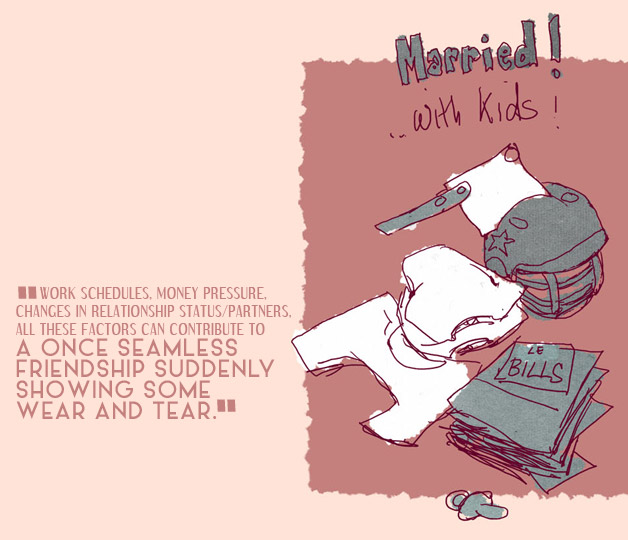We all know how friendships get founded. Whether it happens in kindergarten or college, shared interests, complementary personalities and bonding experiences are the essential ingredients involved. When you meet people you connect with—especially those with whom the bond is well beyond the superficial—you can’t imagine how your life ever worked without them in it. And of course, you never picture a time coming when it will have to in the future. After all, friends—particularly the soulmate variety—are, as people like to say, “the family you choose.”
With most friendships in young adulthood, closeness comes with experiencing big things together. Your first apartments, first loves, big breakups, big parties, epic hangover brunches, and all the little forgettable moments in between, that together form the private clubhouse of memories in which you all reside. No problem seems too big for your friends to help you solve, and they are by far your first choice for any occasion be it talking trash about an ex, wallowing in self-pity, celebrating a promotion or dealing with a health scare. You just get each other, and you’re sure that’s never going to change.
And then one day it does. Busy lives are de rigeur, but as time passes and you find the windows between hangouts stretching ever longer apart, a question mark forms. Work schedules, money pressure, changes in relationship status/partners, all these factors can contribute to a once seamless friendship suddenly showing some wear and tear. So, when you do finally find the time to meet, the amount of stuff that has happened since your last chat leads to either a total info-dump, that leaves little time to dissect life’s complexities (what did that girl at work really mean when she said your ideas were always “out there?”), or an awkward exchange of pleasantries with neither of you knowing how to jump into the heart of what has really been going on.
The first get together like this hopefully leaves you both more committed to finding time for each other, but inevitably, the gap between hangs widens, and slowly the resentment builds. Why is whatever your friend is doing with their time so much more important to them than spending some time with you? Don’t they miss how it used to be? Are they over it? Could they possibly be judging you for the ways your life has or hasn’t changed—or worse, how your priorities and your perspective—have or haven’t changed based on your own circumstances? On the flip side, have they even noticed that it has? These questions are like fruit flies; as long as you let the friendship sit ripening to rotten, the more they multiply.
There isn’t one way to fix this issue—it’s a biggie—and in some cases it may not even be immediately fixable. As we grow up, our lives change and everyone’s trajectory is different. Some people may grow out of wild nights out and midweek drinks, while their besties continue to love blowing off steam. While some are ready to settle into domestic bliss, their friends are more interested in planning a globetrotting adventure or throwing themselves into their next career step. Bottom line: you can’t force your friends to be ready for the same life changes you are excited to grasp hold of, even if in your heart of hearts you feel like they should want the same things you do because you used to be so in sync. I mean, doesn’t it stand to reason that they would be turning the page alongside of you? Not really, unfortunately. Life just isn’t that simple—how could it be when people themselves aren’t? As people’s circumstances change, so can they. If though, a friendship is important enough to you, brave the shifting winds and embrace change by finding a new middle ground.
To do this, you first have to clear your head of all those pesky fruit fly questions. Just because someone doesn’t want what you do at the moment, doesn’t mean they are judging you for your choices. And, just because they don’t seem to make time for you, doesn’t mean that you’re not still important to them. Don’t forget, friendship is a two-way street; unless you have made an effort time and again to see them, and been constantly brushed off, perhaps you need to assess whether you are contributing to the drift by not putting enough energy in yourself. You might just find, you’ve actually contributed to the drift without knowing. Priority one: try to get a clear look at what’s happening on your end. Priority two: talk to your friend about how they can help rekindle the friend-love, but also why it’s important to you to keep them in your life as much as they once were.
We all hit walls in our own lives that make socializing like we used to difficult. To be good friends to those we love, part of the contract is understanding that not everything your friends do is all about you. This extends to being ready for some of their choices upsetting us. A friend who is in a state of change might not be as thoughtful as they normally would be. Their choices may not make sense. The first rule of keeping friendships intact is to give each other the benefit of the doubt. If someone was important enough to think of as family during the good times, they’re also worth giving the leeway you would give family during the hard times.
The next step is to stop trying to fit a square peg in a round hole. Your friend just had a baby? She is not going to say yes when you text her for a midweek post-work drink. She might instead be thrilled if you suggest a post-work walk with the stroller. Or better yet, an hour of your free babysitting services so she can nap, followed by hot coco and a chat. It isn’t always on our friends to change their new routines, or for those still doing things the way we used to, to catch up with our new ways. Both parties need to be willing to meet in the middle, sometimes doing things that no longer or don’t yet appeal, for the sake of the other. The beauty in this is that each friend might get something refreshing out of it, trying out a lifestyle you hadn’t yet pictured for yourself or remembering the fun of something you once really enjoyed. Compromise can feel like a drag in theory (we all just want to do things our own way at the heart of it), but it almost inevitably feels great in practice.
Finally, the true key to rolling with the changing landscape of a friendship is to be honest about it. Pretending nothing is different, while secretly feeling further and further apart, is the death knell of any important relationship. It can be frightening to spill your guts, and risk that once the truth is out there the problem will only get worse. The funny thing is, almost universally the opposite is the case. Once you’ve told your friend how the distance you’re noticing makes you feel, they will likely sigh in relief that you’ve identified just what they are feeling too, or be shocked that they didn’t notice you were feeling that way. Then you can both get your heads around how to come back together, rather than allowing the chasm to continually expand. You may have a lot of compromises to make, and it may feel like a struggle, but in the end, it is the only way. After all, yes, you do choose your friends, but once you do, they’re family, and family is always worth fighting for.

















